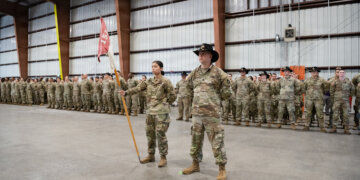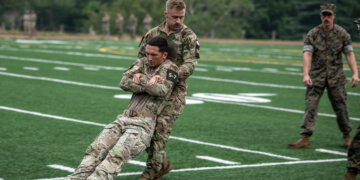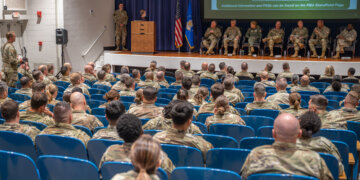More than 1,900 soldiers have a chance to continue their service after they were voluntarily or involuntarily separated for refusing the COVID-19 vaccine, according to U.S. Army spokesperson Christopher Surridge. If a service member’s sole reason for separation was vaccine refusal, they will now have the opportunity to correct the characterization of their discharge in their records and return to service if they choose.
“The 2025 executive order ‘Reinstating Service Members Discharged under the Military’s COVID-19 Vaccination Mandate’ directs the Department of Defense to offer individuals involuntarily separated, or who voluntarily separated due to COVID-19 vaccine mandates, an opportunity to return to service if they meet Army retention standards,” Surridge said.
In a memorandum dated Feb. 7, the Office of the Under Secretary of Defense mandated Secretaries of the Military Departments to contact service members in two groups: those who were involuntarily separated and others who voluntarily separated or retired unvaccinated because of the COVID-19 vaccine mandate. The former service members have until February 2026 to seek reinstatement.
Those who were involuntarily separated have been offered an expedited reinstatement and record correction via the Boards for Correction of Military/Naval Records (BCM/NR) process. This group is eligible for compensation for lost service time due to separation.
The memo also ordered broad communication with the group of service members who voluntarily left the service through channels like social media, external websites and newsletters. This group will not be eligible for back pay or compensation. If they’re reinstated, both groups require a commitment minimum of two years in active service.
Maine National Guard put out the call for former service members interested in reinstatement soon after the memorandum’s publication. U.S. Army Maj. Nick Erickson, the state public affairs officer, said there’s one individual who was specifically separated from the Maine Air National Guard for vaccine refusal; however, there are approximately 40 from the Maine National Guard who retired or separated unvaccinated. Erickson said the plan is to send out messaging prior to following up with each individual.
“Many soldiers and airmen left National Guard service in 2021 to 2022 for various reasons and were unvaccinated at the time of their separation,” he said. “Those are the individuals we are aiming to reach out to specifically. If the mandates were a reason for their voluntary separation, we welcome them to continue service as we do with all that are willing and eligible to serve the state and nation.”
Former service members who were involuntarily separated for vaccine refusal will receive an outreach packet from the Department of the Army with an invitation to seek reinstatement and an explanation of the expedited BCM/NR process. Those who voluntarily separated could contact a recruiter to go through the re-accessioning process, but they will also receive a packet that includes information about expedited reintegration.
Though the reinstatement processes will take priority, Surridge said the timeframe will vary depending on individual circumstances. Members reintegrating will need to go through administrative prescreening, a records review, and physical and medical eligibility evaluation to ensure they meet appropriate Army retention standards. Department secretaries are required to report status updates regarding program outreach and status of service members in the reintegration process every 30 days.
“The coronavirus disease 2019 (COVID-19) vaccine mandate was an unfair, overbroad, and completely unnecessary burden on our Service members,” said Darin Selnick, Acting Under Secretary of Defense for Personnel and Readiness, in the memorandum. “Service members were not afforded a timely, fair, or measured process to seek and receive an accommodation from this requirement but were unjustly separated solely for refusal of the vaccine, regardless of their years of service given to our Nation.”
Read the full executive order from President Trump.
Read comments






































